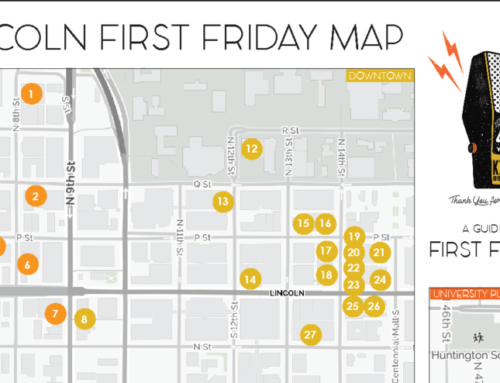By Casey Welsch
April 25, 2018
 A plan to develop a dilapidated industrial area on the edge of downtown Lincoln met some resistance from community members concerned about affordable housing at a City Council hearing Monday.
A plan to develop a dilapidated industrial area on the edge of downtown Lincoln met some resistance from community members concerned about affordable housing at a City Council hearing Monday.
Speedway Properties and Nelnet laid out their plans for a $72 million second round of development in the Telegraph District, a former industrial enclave southeast of downtown near Lincoln High School. Phase one of development in the area involved Nelnet refurbishing office space and The Mill coffee shop opening a new location that also serves alcohol. Phase two would substantially alter the district into a mixed-use area of shopping and residences. The developers are asking for $8.9 million in tax-increment financing from the city.
Clay Smith, a general partner in Speedway Properties, said the developed Telegraph District will include ample space for shopping, “working class” housing and will be “a paradise for bikers.”
“All age groups want to live in or near downtown,” Smith said before the council. “We want to turn a largely vacant industrial tract into a vibrant downtown setting.”
According to Smith, once-vacant buildings in the Telegraph District now house more than 1,000 employees thanks to the first round of development. He said The Mill’s new location there is already the coffee shop’s most profitable.
“And if you know any other pioneers, I encourage you to let them know,” Smith said to the council, drawing chuckles from its members.
Not everyone at the hearing was so optimistic about the commercial development plan. Several community members voiced concerns before the council about the effects development would have on rents and property taxes for low-income residents in the neighborhood.
“The Telegraph District is adjacent to one of the city’s densest residential areas,” said Isabel Salas, a South of Downtown resident and an employee of the South of Downtown Community Development Organization. “Lincoln is experiencing a housing crisis.”
According to Grant Daily with the affordable housing advocacy group Renters Together, who also spoke at the hearing, 5,359 people live just south of the Telegraph District, and many of them could face relocation as a result of further development. He cited that the median income of residents in the area is low, just $21,500-$23,300 per year.
“The Telegraph District is a transitioning district,” said Chelsea Egenberger, who also spoke on behalf of Renters Together. “Lots of people are struggling to pay rent already. What will you as council members do to ensure affordable housing in Lincoln?”
Six people testified either in support of affordable housing or in outright opposition to the Telegraph District development.
“Not all taxpayers are very moneyed,” said Jewel Rodgers, who lives in the South of Downtown area. “I’ve lived all my life in blighted, substandard communities. Development doesn’t lead to higher standards of living for impoverished residents.”
Rodgers said she grew up in North Omaha and saw commercial developments displace poor people in that neighborhood.
“We’re already strained to consume,” she said. “Adding more opportunities to consume does not help us.”
David Landis, director of the city’s Urban Development Department, agreed with the testifyers that Lincoln needs more cheap housing.
“Lincoln has an affordable housing problem,” he said. “Too few units are within the means of low-income people.”
Landis tried to assuage some of the concerns of the affordable housing advocates, saying that the Telegraph District development plan doesn’t take down any existing housing, so there will be “no gentrification.”
Rodgers scoffed at this notion.
“That’s borderline impossible,” she said. “Large developments on any piece of land raises property taxes. Your rents will rise if this area is developed.”
Renters Together representative Amanda Huckins agreed with Rodgers.
“We get raises in rent when development occurs,” Huckins said. “Development causes instability for vulnerable populations in underdeveloped housing.”
Huckins opposed the use of TIF for development unless the agreement included provisions for affordable housing.
Smith said in a rebuttal to the testifiers that “we did consider that when we were developing this plan.” He said that the proposed housing for the redeveloped area, about 200 units, will be aimed at working people, and that there will be “no displacement.”
Smith also agreed that Lincoln needs to focus on affordable housing development, but that any such effort should not be centered around a single development such as his.
“We’re not going to solve all those issues here,” Smith said. “The community issues are real. We need a citywide effort and a public hearing, not trying to make city policy based on one development.”
Smith said in the hearing that Speedway Properties does offer rents as low as $250 a month in other areas of the city, but a call to a leasing agent revealed that the company’s only units for that price were single offices not for residential use. Speedway also has no properties available for residents with affordable housing vouchers.
Councilwoman Jane Raybould remarked briefly after Smith’s rebuttal, mentioning the concept of “new urbanism,” and voicing support for a development that supports a “healthy mix” of high- and low-income residents.
The City Council is expected to approve the second phase of Telegraph District development at its April 30 meeting. If passed, the redevelopment agreement will be the largest in Lincoln’s history.
View a proposal of the development (PDF via the City of Lincoln). Listen below to audio from the City Council hearing Monday, recorded by Casey Welsch for KZUM.
Casey Welsch is a KZUM contributor.





